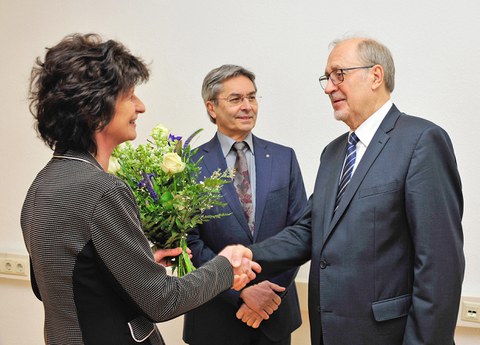Jan 31, 2017
TU Dresden scientist awarded most prestigious prize for science and technology by the Chinese State Government

Dr. Eva-Maria Stange, Saxon State Minister of Science and the Arts and Prof. Hans Müller-Steinhagen, Rector of TU Dresden congratulate TU Dresden scientist Prof. Werner Hufenbach on the 2016 ›International Scientific and Technological Cooperation Award‹.
For his outstanding commitment to the German-Chinese scientific exchange in the field of lightweight construction, the Chinese Government has awarded TU Dresden's Prof. Dr.-Ing. habil. Werner Hufenbach the 2016 ›International Scientific and Technological Cooperation Award‹. The award is the most significant Chinese accolade in this area. Prof. Hufenbach is the first and, to date, only international scientist in the field of engineering to receive this prize, which has been presented during an official act of state in the Great Hall of the People, led by the President of the People’s Republic of China, Xi Jinping. Apart from Prof. Hufenbach, Prof. Dr. Katharina Kohse-Höinghaus of the University of Bielefeld, and three scientists from France, Mexico and the USA received the 2016 award.
Since the early 1980s, Prof. Hufenbach has been committed to bilateral research co-operation between Germany and China – in the early stages as a member of TU Clausthal, later based at TU Dresden. ‘For us, it has always been about fruitful joint projects aiming at the implementation of cutting-edge scientific expertise into technical processes’, says Prof. Hufenbach.
In 1994, Professor Hufenbach founded the Institute of Lightweight Engineering and Polymer Technology at TU Dresden and turned it into one of the leading national and international research institutes in this field. Even today, he is still serving as Senior Professor on the institute’s executive board . With over 240 employees and about 11 million euros in third-party funding in 2016, the institute is one of TU Dresden’s key institutions of. From the very beginning, the success of the Institute of Lightweight Engineering and Polymer Technology has been closely tied to major projects, co-funded by the German Research Foundation (Deutsche Forschungsgemeinschaft, DFG): ‘Two research groups, three Collaborative Research Centres and one Priority Programme provided me with a highly qualified and financially secure environment, enabling me to push my ideas forward, acquire basic research findings and generate innovative scientific methods’, Prof. Hufenbach on his time at the institute.
Already in 1995, the Dresden Model of ›function-integrative system lightweight engineering in multi-material design‹ was developed by Prof. Werner Hufenbach. This happened in the context of an innovative research network, linked to TU Dresden and many extra-mural research institutions.
From 2002 to 2013, Hufenbach researched and taught at the Chinese German College (Chinesisch-Deutsches Hochschulkolleg, CDHK) of Tongji University in Shanghai, a TU Dresden partner university. Since 2015, he and CRRC Qingdao Sifang – the world market leader in the railway sector – have been developing an open innovation platform for lightweight trains of the future. This co-operation resulted in the establishment of a Dresden-based Chinese-German joint venture.
Prof. Hans Müller-Steinhagen, Rector of TU Dresden states: ‘We are exceptionally delighted that the Chinese government acknowledged the accomplishments of our colleague Professor Werner Hufenbach with its most prestigious award in the field of scientific and technological collaboration – the ›International Scientific and Technological Cooperation Award‹. As a University of Excellence, we are proud that this honour was bestowed upon a scientist of our university who, for decades, has successfully devoted himself to the integration of cutting-edge research into technical processes – inter alia, in co-operation with Chinese institutions. With this award, the so-called Dresden model of ›function-integrative system lightweight engineering in multi-material design‹ gains even more international recognition.’
Prof. Hufenbach on the Chinese award: ‘This award is the pinnacle of my career as it connects science and technology. This connection was and still is a basic concern of my professional activity. This is also reflected in my Dresden Model of ›function-integrative system lightweight engineering in multi-material design‹. Today, this model is the national and international standard for modern lightweight construction. It contains the entire value-added chain, from materials development to design, simulation, process, quality and finally the product. The model is designed as a cross-materials and cross-industry approach and requires extensive cross-sectional knowledge.’
The Saxon State Minister of Science and the Arts, Dr. Eva-Maria Stange: ‘I warmly congratulate Prof. Hufenbach on this great state honour. Not only is he a founding member of lightweight construction at TU Dresden and in Saxony, but since then, he has also been setting international standards. His strong commitment in China brought international acclaim to the Free State of Saxony as a hub for lightweight construction. Experts from Chemnitz and Freiberg also benefit from this prominence. With his dedication in Saxony and China, Prof. Hufenbach proves that science is international and can only be successful if experts exchange their knowledge from different fields and closely co-operate with one another.’
